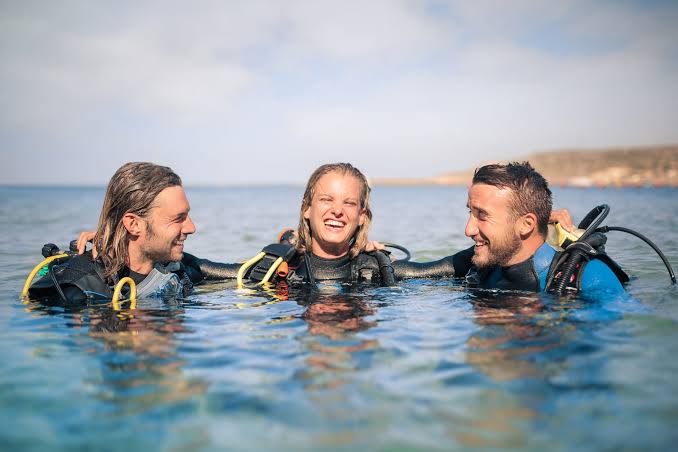Scuba diving is an exhilarating underwater activity that allows adventurers to explore the vast, vibrant marine world using a self-contained underwater breathing apparatus (scuba). This recreational activity offers an unparalleled glimpse into the underwater realm, making it a favorite for thrill-seekers and nature lovers alike.
Among top-rated diving spots, scuba diving in the Caribbean stands out due to its crystal-clear waters and diverse marine ecosystem. Whether you’re a novice or an experienced diver, the Caribbean offers an incredible underwater experience with its extensive coral reefs and abundant marine life.
Preparing for Your First Dive
Getting ready for your inaugural dive involves thorough preparation. To begin with, sign up for a certified diving school, where you will learn the essential skills and safety procedures of scuba diving. These courses usually include theoretical lessons, practical sessions in a pool, and open-water dives. Physical fitness is also crucial, as diving can be demanding.
Ensuring you’re in good health can make your experience more enjoyable and safer. Before heading underwater, familiarize yourself with the basic principles of scuba diving through courses offered by certified institutions such as PADI. These organizations provide structured learning modules, helping you gain confidence and proficiency in diving techniques.
Essential Gear for Scuba Diving
Having the right gear is essential for a safe and enjoyable dive. The most important pieces of equipment include:
- Mask: Ensures you can see clearly underwater. A good fit is crucial; the mask should create a seal around your face to prevent water from seeping in.
- Fins: Aid in your movement through the water. They provide propulsion and help you navigate efficiently.
- Regulator: Allows you to breathe underwater by providing air from your tank. It includes the mouthpiece and hoses that connect to your tank.
- Wet Suit: Traps a small amount of water between your body and the suit to keep you warm. The temperature of your body then warms this layer.
- BCD (Buoyancy Control Device): Helps you manage your buoyancy underwater. It allows you to float, hover, or sink as needed by adjusting the amount of air in the device.
Safety Tips to Keep in Mind
Safety should always be a priority when diving. Key tips include diving with a buddy, keeping an eye on your air supply, and avoiding rapid ascents. Diving with a partner ensures that help is nearby if something goes wrong. Monitoring your air levels ensures you have enough to complete your dive safely. Additionally, pay attention to your surroundings to steer clear of potential hazards.
Diving allows you to explore beautiful but sometimes unpredictable environments. According to the Divers Alert Network, regularly assessing your physical and mental state before each dive can significantly minimize risks. It’s essential to be honest with yourself about your capabilities and to communicate openly with your diving buddy.
Learning the Required Skills
Before venturing into open water, it is essential to master fundamental skills, such as clearing your mask, controlling buoyancy, and effective underwater communication. Practicing these skills in a pool can build your confidence and ensure you are prepared for open-water dives.
For example, learning to clear your mask of water while underwater is a skill that can prevent panic and ensure you see clearly. Buoyancy control is crucial for maintaining a safe and enjoyable dive, allowing you to avoid damaging the reef or stirring up sediment. Participation in local diving clubs or guided practice sessions can also be beneficial. These groups often provide support, camaraderie, and additional training opportunities that can enhance your skills and confidence.
Top Destinations for Beginner Divers
The world is home to numerous locations ideal for novice divers. These spots typically feature clear waters, moderate currents, and abundant marine life. Popular destinations include the Great Barrier Reef in Australia, Bonaire in the Caribbean, and the Red Sea in Egypt. Exploring the turquoise waters of the Turks and Caicos Islands aboard a private yacht from Poseidon Charters also gives divers the possibility to discover breathtaking diving locations.
The Great Barrier Reef offers extensive coral formations and diverse marine species, making it a fantastic playground for new divers. Bonaire is known for its shore diving opportunities, providing easy access to beautiful dive sites without needing a boat.
The Red Sea, with its clear waters and rich marine biodiversity, offers exceptional visibility and an array of dive sites suitable for beginners. These regions provide a safe and thrilling introduction to the world of scuba diving.
What to Expect During Your Dive
Your first scuba dive is bound to be an unforgettable experience. You will encounter vibrant coral reefs, fascinating marine creatures, and the unique sensation of weightlessness. The underwater world is full of surprises, from colorful fish to intriguing underwater formations.
Follow your guide’s instructions, monitor your air supply closely, and remain calm to fully enjoy the underwater beauty. The sensation of floating effortlessly and observing marine life in its natural habitat is exhilarating and serene. Whether you’re diving in tropical waters or exploring cold-water dive sites, the thrill of scuba diving remains unparalleled. Every dive offers a new adventure and the chance to create lasting memories.
Post-Dive Care: Taking Care of Yourself and Your Gear
After your dive, ensure you hydrate and avoid strenuous activities for at least 24 hours. Rehydrating helps your body recover from the effects of diving. Proper care of your diving equipment is also essential. Rinse your gear with fresh water to eliminate salt and debris, then store it correctly.
Saltwater can be corrosive, and removing it helps extend the life of your equipment. Regular maintenance extends the lifespan of your equipment, ensuring it remains safe and reliable for future dives. Proper care of your gear is an investment in your safety and the enjoyment of your diving experiences.





